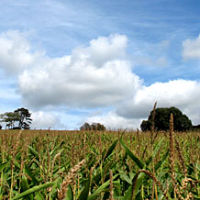
Richard Evershed
Our research in this area, lead by Professor Richard Evershed, builds upon our identification of bacteria actively oxidising atmospheric methane (Nature 2000), with the aim of linking the capacity of soil methane removal to the activity of these vital bacteria.
We studied the impact of fertiliser application on the activity of these bacteria in Welsh upland grassland soils. Inorganic fertilizer-treated soils from long-term agricultural plots’ methanotrophic bacterial cell numbers were reduced by up to 80%. Also, while fertilisation inhibited methanotrophic bacteria, nitrogen additions promoted overall growth of soil microbes, increasing CO2 emissions.
Further work at Rothamsted Research, where wheat had been grown annually for 163 years, showed methanotrophic cell numbers were reduced
 by long-term agriculture. Interestingly, organic manuring led to higher cell numbers and enhanced methane removal compared to conventional inorganic fertiliser practices.
by long-term agriculture. Interestingly, organic manuring led to higher cell numbers and enhanced methane removal compared to conventional inorganic fertiliser practices.
These results emphasize the need to rigorously assess commonly applied agricultural practices with respect to their unseen, negative impacts on soil bacteria and ecosystem services related to maximising the soil carbon sink potential.
This work has produced five peer reviewed papers; seven conference abstracts; a book chapter; two further PhD projects; and a NERC standard grant research project investigating the sequestration of methane carbon in soils from various locations across the world.
Read more about the Food Security and Land Research Alliance.